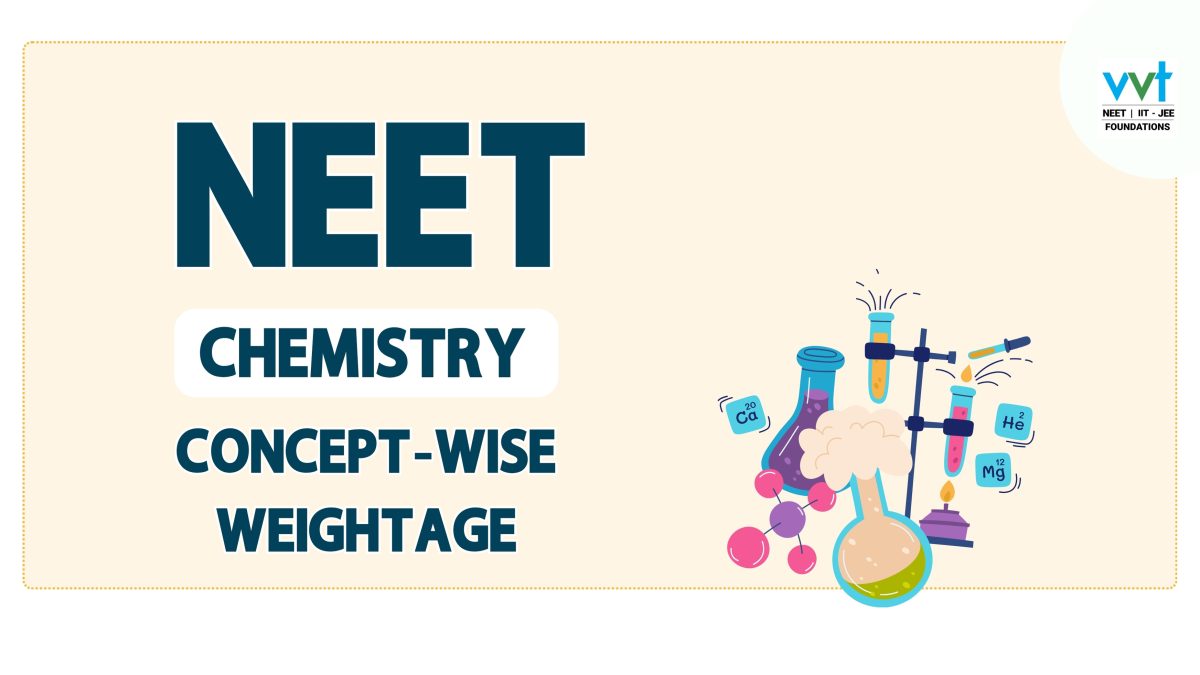
NEET Physics Chapter-Wise Weightage
March 3, 2025
NEET Chemical Bonding and Molecular Structure: Notes and Tips by VVT Coaching
March 6, 2025NEET Chemistry Chapter-wise and Concept-Wise Weightage
VVT Coaching Chennai – Ranked #1 Best NEET Coaching Centre by Times Now!
Cracking NEET 2025 requires a deep understanding of Chemistry and its concepts-wise weightage. With the right preparation strategy, you can maximize your score by focusing on high-yield chapters. At VVT Coaching Chennai, we help students streamline their studies with expert guidance, structured plans, and proven problem-solving techniques.
This guide breaks down the NEET Chemistry syllabus, highlighting the most important chapters and providing strategic insights to help you master the subject efficiently.
NEET Chemistry Section-Wise Weightage Overview
The NEET Chemistry paper is divided into three main sections: Physical Chemistry, Organic Chemistry, and Inorganic Chemistry. Understanding the weightage of each section is crucial for effective preparation.
Physical Chemistry
Physical Chemistry typically accounts for about 31-33% of the Chemistry section in NEET. This translates to approximately 14-15 questions out of the total 45 Chemistry questions.
Organic Chemistry
Organic Chemistry usually carries the highest weightage, accounting for about 33-36% of the Chemistry section. This means you can expect around 15-16 questions from this section.
Inorganic Chemistry
Inorganic Chemistry generally has a weightage of about 25-30%, translating to approximately 15-16 questions in the NEET exam.
NEET Chemistry Chapter-Wise and Concept-wise Weightage Breakdown
| Subject | Chapter | Weightage (2015-2024) |
| CHEMISTRY | P-BLOCK ELEMENTS | 6.99% |
| CHEMISTRY | HYDROCARBONS | 6.41% |
| CHEMISTRY | CHEMICAL BONDING & MOLECULAR STRUCTURE | 5.63% |
| CHEMISTRY | ORGANIC CHEMISTRY-SOME BASIC PRINCIPLES AND TECHNIQUES | 5.44% |
| CHEMISTRY | EQUILLIBRIUM | 5.24% |
| CHEMISTRY | ALDEHYDES & KETONES & CARBOXYLIC ACIDS | 5.05% |
| CHEMISTRY | CO-ORDINATION COMPOUNDS | 4.85% |
| CHEMISTRY | THERMODYNAMICS | 4.08% |
| CHEMISTRY | CHEMICAL KINETICS | 3.88% |
| CHEMISTRY | ELECTRO CHEMISTRY | 3.88% |
| CHEMISTRY | AMINES | 3.88% |
| CHEMISTRY | ALCOHOLS & PHENOLS & ETHERS | 3.50% |
| CHEMISTRY | BIOMOLECULES | 3.11% |
| CHEMISTRY | SOME BASIC CONCEPTS OF CHEMISTRY | 3.11% |
| CHEMISTRY | SOLUTIONS | 2.91% |
| CHEMISTRY | d & f- BLOCK ELEMENTS | 2.91% |
| CHEMISTRY | S-BLOCK ELEMENTS | 2.91% |
| CHEMISTRY | STRUCTURE OF ATOM | 2.91% |
| CHEMISTRY | SOLID STATE | 2.72% |
| CHEMISTRY | STATES OF MATTER | 2.14% |
| CHEMISTRY | SURFACE CHEMISTRY | 2.14% |
| CHEMISTRY | REDOX REACTIONS | 2.14% |
| CHEMISTRY | CLASSIFICATION OF ELEMENTS AND PERIODICITY IN PROPERTIES | 1.94% |
| CHEMISTRY | HALOALKANES AND HALO ARENES | 1.94% |
| CHEMISTRY | GENERAL PRINCIPLES AND PROCESSES OF ISOLATION OF ELEMENTS | 1.75% |
| CHEMISTRY | POLYMERS | 1.75% |
| CHEMISTRY | 14 TH GROUP ELEMENTS (P-BLOCK) | 1.55% |
| CHEMISTRY | CHEMISTRY IN EVERYDAY LIFE | 1.36% |
| CHEMISTRY | 13 TH GROUP ELEMENTS (P-BLOCK) | 1.36% |
| CHEMISTRY | ENVIRONMENTAL CHEMISTRY | 1.17% |
| CHEMISTRY | HYDROGEN | 0.97% |
| CHEMISTRY | PRACTICAL CHEMISTRY | 0.39% |
Download Chapter and concept wise Question weightage PDF
For your convenience, we’ve prepared a downloadable PDF summarizing the NEET Chemistry concepts-wise weightage. This handy reference will help you keep track of important chapters and their relative importance in your preparation.
Key chapters and Concepts in High-Weightage chapters
To help you focus your studies, here are some key chapters and concepts from high-weightage chapters that you should pay special attention to:
Thermodynamics
- First, Second, and Third Laws of Thermodynamics
- Enthalpy, Entropy, and Gibbs Free Energy
- Hess’s Law and Born-Haber Cycle
Hydrocarbons
- Nomenclature and Classification
- Isomerism in Alkanes, Alkenes, and Alkynes
- Reactions of Hydrocarbons
p-Block Elements
- Group 13-18 Elements: Properties and Reactions
- Oxides and Oxyacids of Nitrogen, Phosphorus, Sulphur, and Halogens
- Inert Gases and their Applications
Remember, while these chapters are crucial, don’t neglect other chapters. A comprehensive understanding of the entire syllabus is key to excelling in NEET Chemistry.
Also check:
.NEET Physics Chapter-Wise Weightage
.Last 60 Days NEET Strategy: Smart Revision Tactics
.NEET Chapter Wise Weightage 2025: Complete Guide with Important Chapters
NEET Chemistry Preparation Strategy Based on Weightage
Now that we’ve explored the concepts-wise weightage, let’s discuss how to leverage this information for effective NEET Chemistry preparation:
- Prioritize High-Weightage chapters: Allocate more time and resources to chapters with higher weightage. For instance, spend extra time on Thermodynamics, Hydrocarbons, and p-Block Elements.
- Balance Your Preparation: While focusing on high-weightage chapters, don’t completely neglect lower-weightage chapters. They can still contribute significantly to your overall score.
- Regular Revision: Create a revision schedule that aligns with the weightage distribution. Revise high-weightage chapters more frequently.
- Practice Questions: Solve a higher number of practice questions from high-weightage chapters. This will improve your problem-solving speed and accuracy.
- Concept Clarity: Ensure you have a strong grasp of fundamental concepts, especially in high-weightage chapters. This will help you tackle even the toughest questions.
Expert Tips for Mastering High-Weightage Chemistry chapters
Here are some expert-recommended strategies to excel in high-weightage NEET Chemistry chapters:
- Create Concept Maps: Visualize connections between different chapters, especially in complex chapters like Organic Chemistry.
- Use Mnemonics: Develop memory aids for remembering complex reactions and concepts in Inorganic Chemistry.
- Solve Numerical Problems: Practice extensively on calculation-based questions in Physical Chemistry chapters like Thermodynamics and Electrochemistry.
- Focus on Reaction Mechanisms: In Organic Chemistry, understanding reaction mechanisms is crucial. Spend time mastering these for high-weightage chapters.
- Regularly Solve Previous Year Questions: This will familiarize you with the exam pattern and the types of questions asked from high-weightage chapters.
Conclusion: NEET Chemistry with Weightage Insights
Success in NEET Chemistry depends on a smart study plan, consistent practice, and expert guidance. Understanding the concepts-wise weightage allows you to prioritize high-scoring chapters, making your preparation more effective and result-oriented.
At VVT Coaching Chennai, our experienced faculty provides structured study plans, personalized mentoring, and top-tier learning resources to help you master NEET Chemistry with confidence.
Join VVT Coaching Chennai today and take the first step towards your medical dream!
Frequently Asked Questions about NEET Chemistry Weightage
What is the chapter-wise weightage for NEET Chemistry 2025?
The NEET Chemistry syllabus is divided into Physical, Organic, and Inorganic Chemistry sections. While exact weightages may vary, high-weightage chapters include Hydrocarbons, Chemical Bonding, p-Block Elements, Equilibrium, Thermodynamics, and Electrochemistry. It’s crucial to consult the latest NTA guidelines for the most accurate information.
How should I prepare for NEET Chemistry based on chapter weightage?
To prepare effectively, focus on high-weightage chapters first, but don’t neglect others. Use NCERT textbooks as your primary resource, solve previous year questions, and practice regularly. Create a study schedule that allocates more time to chapters with higher weightage while ensuring comprehensive coverage of the entire syllabus.
Which Chemistry chapters carry the highest weightage in NEET 2025?
While weightages can change, historically high-weightage chapters include Organic Chemistry (especially Hydrocarbons and Amines), Physical Chemistry (particularly Thermodynamics and Electrochemistry), and Inorganic Chemistry (focusing on p-Block and d-f Block Elements). Always refer to the latest NTA guidelines for the most current information.
Is it possible to score well in NEET Chemistry by focusing only on high-weightage chapters?
While focusing on high-weightage chapters is important, it’s not advisable to neglect other chapters. NEET questions can come from any part of the syllabus. A balanced approach covering all chapters, with extra emphasis on high-weightage chapters, is the best strategy for scoring well in NEET Chemistry.












